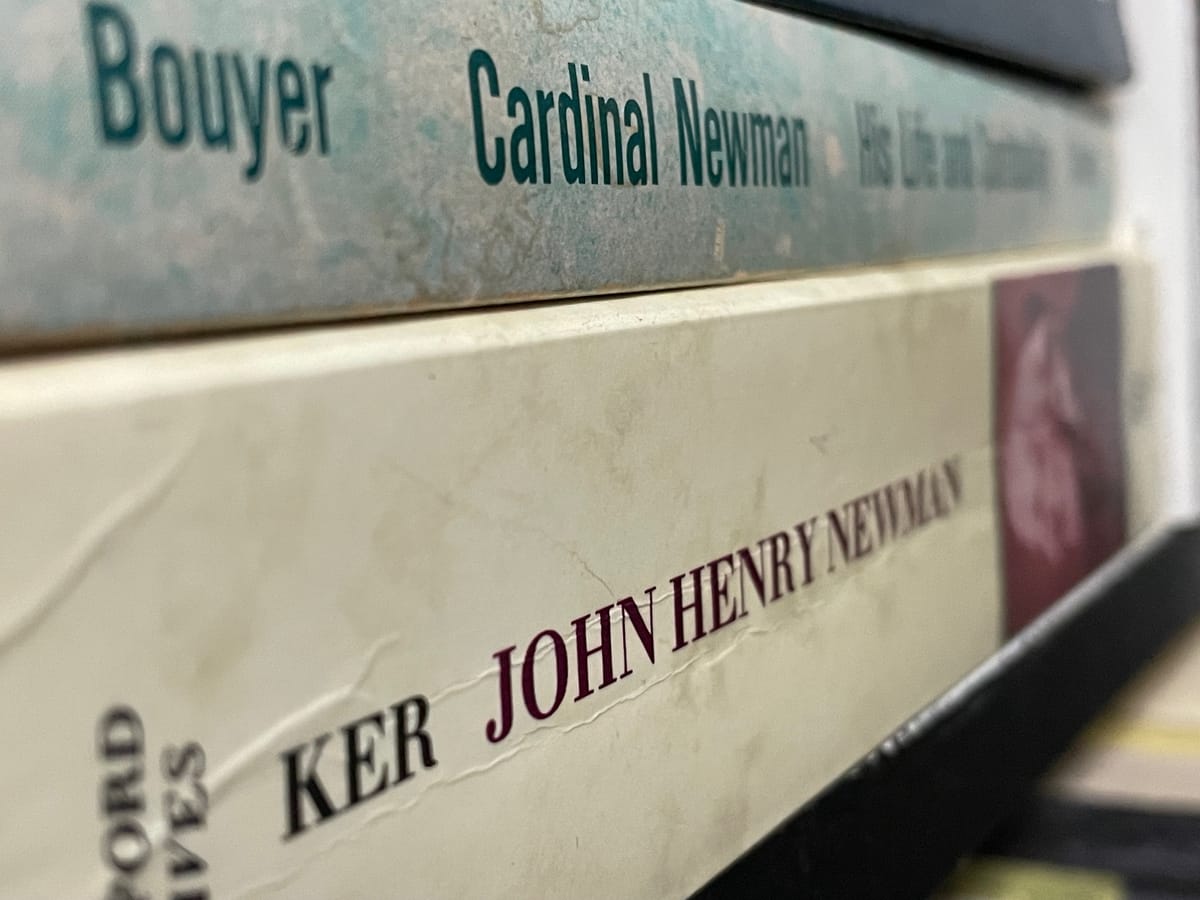Paragraph 7 of This Newman Sermon is Stunning (Plus a Thomas Sowell Kicker)
"Sermon 13: Implicit and Explicit Reason"

Given at Oxford in 1840, five years before his conversion to Rome.
The entire paragraph is pasted at the end. This "note essay" breaks it down.
Reason, Newman observed, "creates to itself a world of ideas."
The italics are crucial: reason talks to itself; creates for itself. That's not the same thing as "corresponding to reality outside oneself" and, indeed, the two can be entirely different: the maniac's reason creates a world for itself that has virtually no correspondence to reality outside itself. We're all a bit maniacal in this regard, some more so than others.
Newman recognized this maniacal tendency. Reason's world of ideas, he said, may or may not "correspond to the things themselves for which they stand."
We perceive things and mush them through our rational faculty and come up with something else. Our reason's grasp of the exterior thing is not the thing itself. It's something else, which may or may not be close to the reality of the thing itself.
Newman then provided a beautiful and dramatic portrayal of the workings of the mind, which kind of reminds me of The Pseudo-Macarius' description of the workings of the heart. It's a fun read (which is something I often say about Newman's prose).
The key "takeaway" from the fun passage is its concluding line: "such mainly is the way in which all men, gifted or not gifted, commonly reason."
When we realize his description of how we all reason, one thing should hit us square between the eyes: Our reason can't be trusted. It's as indispensable as food but, like food, can kill if we fill ourselves with it.
The problem is, we all trust our reason these days. Such is the Cartesian Highway of Modernity: Rationalism. Descartes taught that everything starts with our reason ("I think therefore I am"): reason is prior. Reason is first . . . Reason is king. That's not true, of course: The Act of Existence (the Tao) is prior . . . first . . . king, but the Tao can't be reasoned to and can't be articulated (language is reason's main vehicle on the Cartesian Highway), so the Modern rejects it . . . in favor of his rationality.
It's why modernity has a lot of maniacs in it. They're men and women who trust their rational faculty. As a result, they embrace ideas that may or may not correspond to reality, but because they trust first and foremost in their rational faculty and the ideas spun out of that factory, they don't much care. The important thing is, it's their ideas.
Modern Rationalists' Overweening Pride and Confidence in Their Ideas, No Matter How Empirically Falsifiable, Has Frusurated the Crap Out of Thomas Sowell for Over 50 Years
Thomas Sowell built his career out of attacking such overweening confidence in one's ideas, a confidence that he repeatedly points out, is misplaced when compared (contrasted) to the evidence.
He refers to "visions" and the ideas and schemes born of the visions. Visions, he points out, are necessary but dangerous. His description of "visions" corresponds to Newman's description of how our "reason" works, in the sense that neither is terribly reasonable and neither corresponds to reality: reason and visions are prior to reality.
Reality is far too complex to be comprehended by any given mind. Visions are like maps that guide us through a tangle of bewildering complexities. Like maps, visions have to leave out many concrete features in order to enable us to focus on a few key paths to our goals. [McGilchrist, it's worth pointing out, uses the map analogy to describe how the left hemisphere operates.] Visions are indispensable--but dangerous precisely to the extent that we confuse them with reality itself. . .
A vision has been described as a 'pre-analytic cognitive act.' It is what we sense or feel before we have constructed any systematic reasoning that could be called a theory, much less deduced any specific consequences as a hypothesis to be tested against evidence. . . .
[A vision]] is more like a hunch or a 'gut feeling". . .
The specific problem is that moderns place huge stock in their visions and the workings of their reason, not realizing that neither is necessarily reasonable and, as Sowell points out, empirical evidence shows they're not reasonable, the modern mind rejects the empirical evidence because it conflicts with the vision, and vision, with the rationality that feeds it, is king.
The ones who place the most faith (and it is faith) in their reason and visions deem themselves "the anointed."
Paragraph 7
Reason, according to the simplest view of it, is the faculty of gaining knowledge without direct perception, or of ascertaining one thing by means of another. In this way it is able, from small beginnings, to create to itself a world of ideas, which do or do not correspond to the things themselves for which they stand, or are true or not, according as it is exercised soundly or otherwise. One fact may suffice for a whole theory; one principle may create and sustain a system; one minute token is a clue to a large discovery. The mind ranges to and fro, and spreads out, and advances forward with a quickness which has become a proverb, and a subtlety and versatility which baffle investigation. It passes on from point to point, gaining one by some indication; another on a probability; then availing itself of an association; then falling back on some received law; next seizing on testimony; then committing itself to some popular impression, or some inward instinct, or some obscure memory; and thus it makes progress not unlike a clamberer on a steep cliff, who, by quick eye, prompt hand, and firm foot, ascends how he knows not himself; by personal endowments and by practice, rather than by rule, leaving no track behind him, and unable to teach another. It is not too much to say that the stepping by which great geniuses scale the mountains of truth is as unsafe and precarious to men in general, as the ascent of a skilful mountaineer up a literal crag. It is a way which they alone can take; and its justification lies in their success. And such mainly is the way in which all men, gifted or not gifted, commonly reason,—not by rule, but by an inward faculty.



